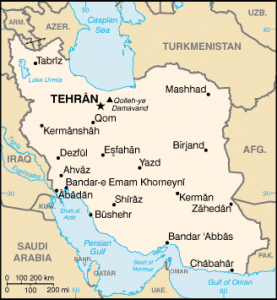The Iran Rundown
January 26, 2013

To Many Americans, Iran is the political adversary of the Middle East. Hostile language towards Western nations, threats to regional allies, as well as threats of nuclear expansion have given world powers reason to be wary of the Islamic nation.
Though feelings and opinions are strong when it comes to Iran, knowledge of the actual history and governmental system of the country is less so. A study conducted by National Geographic reported that 70 percent of the students surveyed could not locate Iran on a map. Even with regular media attention, there is still a lot unknown about the Middle Eastern nation. The U.S. led economic sanctions, as well as the closed off cultural nature of the country have led Iran to be somewhat of an enigma to most Americans. Still, the relationship between the two nations might overshadow decades of complex history, so here’s a brief summary on past and current affairs of Iran.
Most of the current state of affairs between the US and today can be traced to the August of 1953. The C.I.A. and other western intelligence agencies aided in a revolt to overthrow the democratically elected prime minister. For years a western backed authoritarian Shah (a title given to Iranian kings) controlled the nation until the 1979 Cultural Revolution. The events of the revolution led to the takeover of the American embassy by students and militants. 52 Americans were held hostage for 444 days in what is now known as the Iranian Hostage Crisis.
The 1979 revolution or the Islamic awakening as its leaders called it, ultimately led to the dethroning of the Shah, and in that whirlwind of power an oligarchy of Muslim clerics took control. These clerics infused the country with Islamist ideals and laws, replacing more western ones enacted by the U.S. supported Shah. This tone of anti-westernism has been the prevalent tone in the nation’s politics and diplomacy for decades, and to this day still views western nations as an enemy. Such views are not even subtly expressed, as current President Mahmoud Ahmadinejad (like many leaders before him) occasionally refers to the U.S. as “The great Satan.”
Ahmadinejad often causes unrest at United Nations summits as well. Aljazeera News reports on a Sept. 27th speech given at a U.N. conference in New York, Mr. Ahmadinejad refers to Israeli tensions by saying, “Continued threat by the uncivilized Zionists to resort to military action against our great nation is a clear example of this bitter reality.”
Israel and Iran currently are in dangerous straights. As of Nov. 6, Israel prime minister Benjamin Netanyahu claim’s he is ready to attack Iran if need be, says the BBC. “I am; of course, ready to press the button if necessary.” Iran hasn’t been on friendly terms with the Jewish state, and has often been hostile in their relations. This most recent call to arms is over the Iranian nuclear program.
In 2011, The U.S and Canada strengthened economic sanctions against Iran, when reports suggested that Iran may be trying to reap a military application in their Uranium enrichment program. Ahmadinejad and other Iranian leaders deny these claims and insist that the program is solely for the development of nuclear energy, saying that the right to nuclear power was “unalienable.” At another U.N conference according to The Guardian, Ahmadinejad said “Let’s even imagine that we have an atomic weapon, a nuclear weapon. What would we do with it? What intelligent person would fight 5,000 American bombs with one bomb?” Regardless of which many nations are still strongly opposed to the idea as Iran as a nuclear power. Netanyahu states, “As long as I am prime minister, Iran will not have the atomic bomb.”
This leaves a lot for the United States to deal with. President Obama has taken a less hostile stance than his predecessor with Iran. Former President George Bush was often at odds with Iran, and even went so far as to label them as a member of “The Axis of Evil.” In contrast, the White House has given an official statement, in it a willingness to work with the government of Iran in achieving “peaceful nuclear power.” The statement also includes language giving Iranian leaders a choice in how it will interact with the international community. “It is time for the Iranian government to decide whether it wants to focus on the past, or whether it will make the choices that will open the door to greater opportunity, prosperity and justice for its people.”






